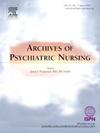The mediating effect of moral distress on workplace violence and compassion fatigue in psychiatric nurses
IF 2.2
4区 医学
Q1 NURSING
引用次数: 0
Abstract
Aims
To examine the associations among compassion fatigue, workplace violence, and moral distress in psychiatric nurses.
Background
The demanding environment of psychiatric departments, characterized by frequent exposure to workplace violence, may contribute to both moral distress and compassion fatigue among nurses. This reciprocal relationship underscores the necessity of interventions targeting both issues concurrently, with the goal of enhancing psychiatric nurses' well-being and retention.
Methods
A convenience sample of 665 psychiatric nurses was recruited from two tertiary psychiatric hospitals in Beijing and Xinxiang City between July and September 2023. Participants completed the Workplace Violence Scale, the Chinese version of the Nurse Moral Distress Scale, and the Chinese version of the Compassion Fatigue Brief Scale. Data were analyzed using SPSS 25.0 for Spearman correlation analysis and Process v3.4 for mediation analysis.
Results
The incidence of workplace violence among psychiatric nurses was 91.9 %. The median (interquartile range) scores for moral distress and compassion fatigue were 45.00 (26.00, 74.00) and 31.00 (18.00, 46.00), respectively. Compassion fatigue was positively correlated with both moral distress and workplace violence (P < 0.05). The mediating effect of moral distress between workplace violence and compassion fatigue was 0.189, representing 20.32 % of the total effect.
Conclusion
Moral distress partially mediates the relationship between workplace violence and compassion fatigue in psychiatric nurses. Hospital administrators should prioritize addressing workplace violence among psychiatric nurses, regularly assess and monitor moral distress, and implement evidence-based interventions informed by positive psychology to mitigate compassion fatigue.
精神科护士道德困扰对工作场所暴力和同情疲劳的中介作用
目的探讨精神科护士同情疲劳、工作场所暴力和道德困扰之间的关系。精神科高要求的工作环境,以频繁暴露于工作场所暴力为特征,可能会导致护士的道德困境和同情疲劳。这种互惠关系强调了同时针对这两个问题的干预的必要性,其目标是提高精神科护士的福祉和保留。方法于2023年7 - 9月在北京市和新乡市两所三级精神病院抽取665名精神科护士作为方便样本。被试完成了工作场所暴力量表、中文版护士道德困扰量表和中文版同情疲劳简要量表。数据分析采用SPSS 25.0进行Spearman相关分析,采用Process v3.4进行中介分析。结果精神科护士工作场所暴力发生率为91.9%。道德窘迫和同情疲劳的中位数(四分位差)分别为45.00(26.00,74.00)和31.00(18.00,46.00)。同情疲劳与道德困扰和职场暴力均呈正相关(P <;0.05)。道德困扰在职场暴力与同情疲劳之间的中介效应为0.189,占总效应的20.32%。结论精神科护士工作场所暴力与同情疲劳之间存在道德困扰的部分中介关系。医院管理者应优先解决精神科护士的工作场所暴力问题,定期评估和监测道德困境,并实施基于积极心理学的循证干预措施,以减轻同情疲劳。
本文章由计算机程序翻译,如有差异,请以英文原文为准。
求助全文
约1分钟内获得全文
求助全文
来源期刊
CiteScore
3.70
自引率
0.00%
发文量
131
审稿时长
160 days
期刊介绍:
Archives of Psychiatric Nursing disseminates original, peer-reviewed research that is of interest to psychiatric and mental health care nurses. The field is considered in its broadest perspective, including theory, practice and research applications related to all ages, special populations, settings, and interdisciplinary collaborations in both the public and private sectors. Through critical study, expositions, and review of practice, Archives of Psychiatric Nursing is a medium for clinical scholarship to provide theoretical linkages among diverse areas of practice.

 求助内容:
求助内容: 应助结果提醒方式:
应助结果提醒方式:


